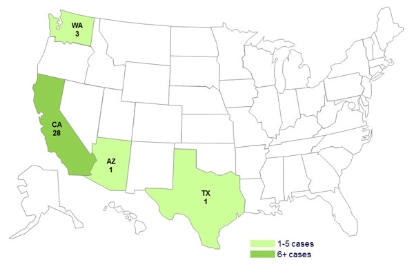The California Department of Public Health has released a report on their investigation into the E. coli O157:H7 outbreak in October 2013 associated with pre-packaged salads sold at Costco and Walgreens stores. The Centers for Disease Control and Prevention (CDC) released their final report on this outbreak in December 2013. Thirty-three people were sickened in this outbreak; seven of those people were hospitalized. Two people developed hemolytic uremic syndrome (HUS), a serious complication of an E. coli infection, from their illness. No deaths were reported.

The outbreak count per state was: Arizona (1), California (28), Texas (1), and Washington (3). The STEC O157:H7 PFGE pattern was new to the PulseNet database. Epidemiologic and traceback investigations indicated that Field Fresh Chopped Salad with Grilled Chicken and Mexicali Salad with Chili Lime Chicken, produced by Glass Onion Catering and sold at Trader Joe’s stores, were the likely sources of this outbreak.
The California report indicates that romaine lettuce was the probable source of the pathogenic bacteria. And they listed two more salads that are associated with the outbreak. One salad was produced by Glass Onion and made for Walgreens stores, called the Good and Delish California Style Grilled Chicken Salad. The other was an unnamed (redacted) salad produced by an unnamed company in Oakland, California. Romaine lettuce produced by Ratto Brothers of Modesto, California was the one common ingredient in all of those products.
Public health officials did not find E. coli O157:H7 in salad samples or environmental samples at Glass Onion facilities. But they did find E. coli O157:H7 at Ratto Bros. farms, even though those bacteria were different from the outbreak strain. E. coli bacteria are found in the intestines of ruminant animals. Two cattle locations were identified 1/4 and 1/2 mile away from the field where the suspect lettuce was grown. In addition, dairy effluent was applied to a corn silage field about 25 years from the suspect field.
The conclusion is that E. coli contamination may have occurred at the farm from farm equipment, runoff, or wind-driven pathogens. Rattos Bros. has improved their growing and harvesting procedures to help avoid future contamination, including a pre-harvest E. coli testing program for raw product, testing for pathogens in irrigation water, and restricting road access with a road monitoring program.




